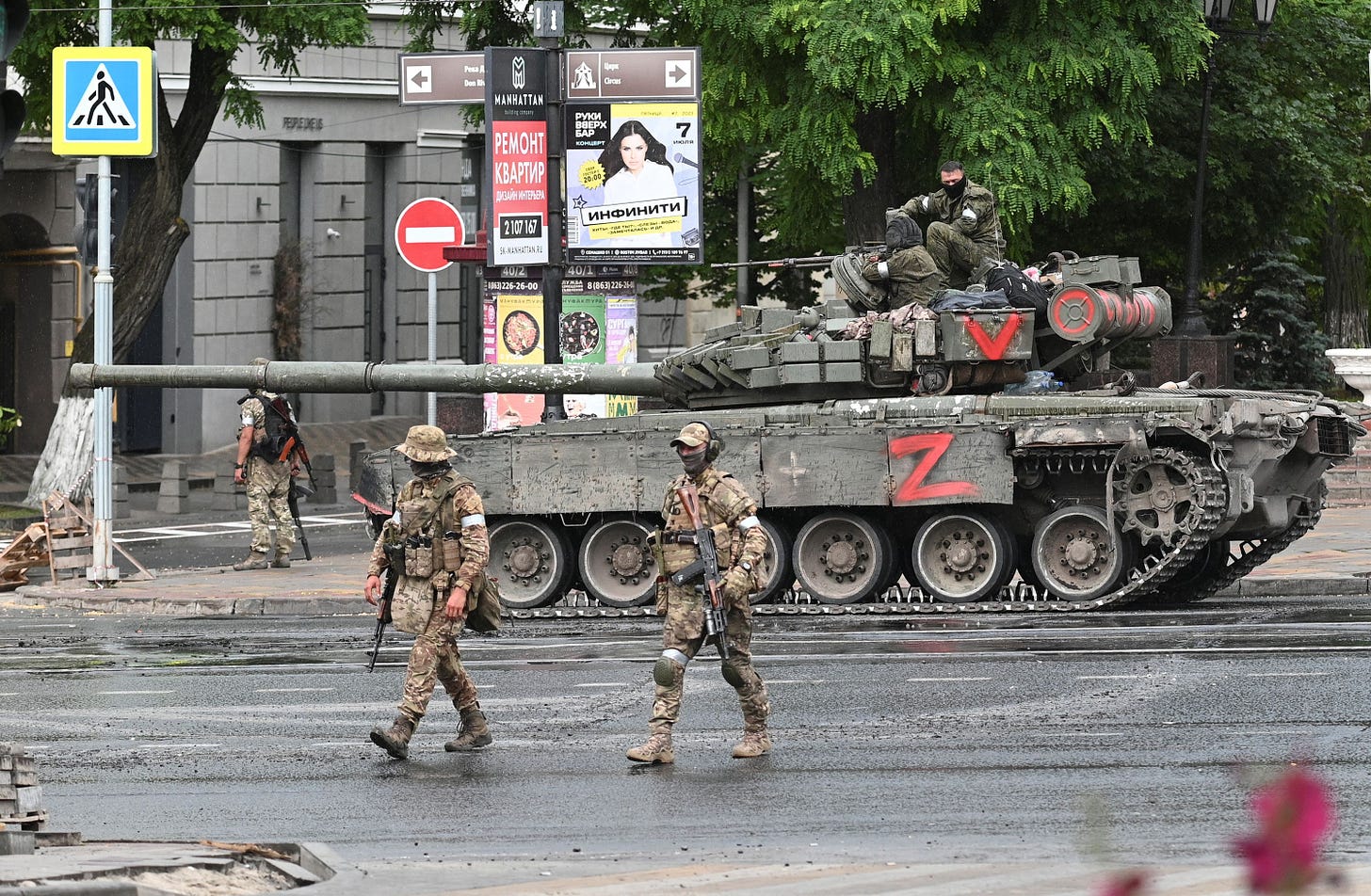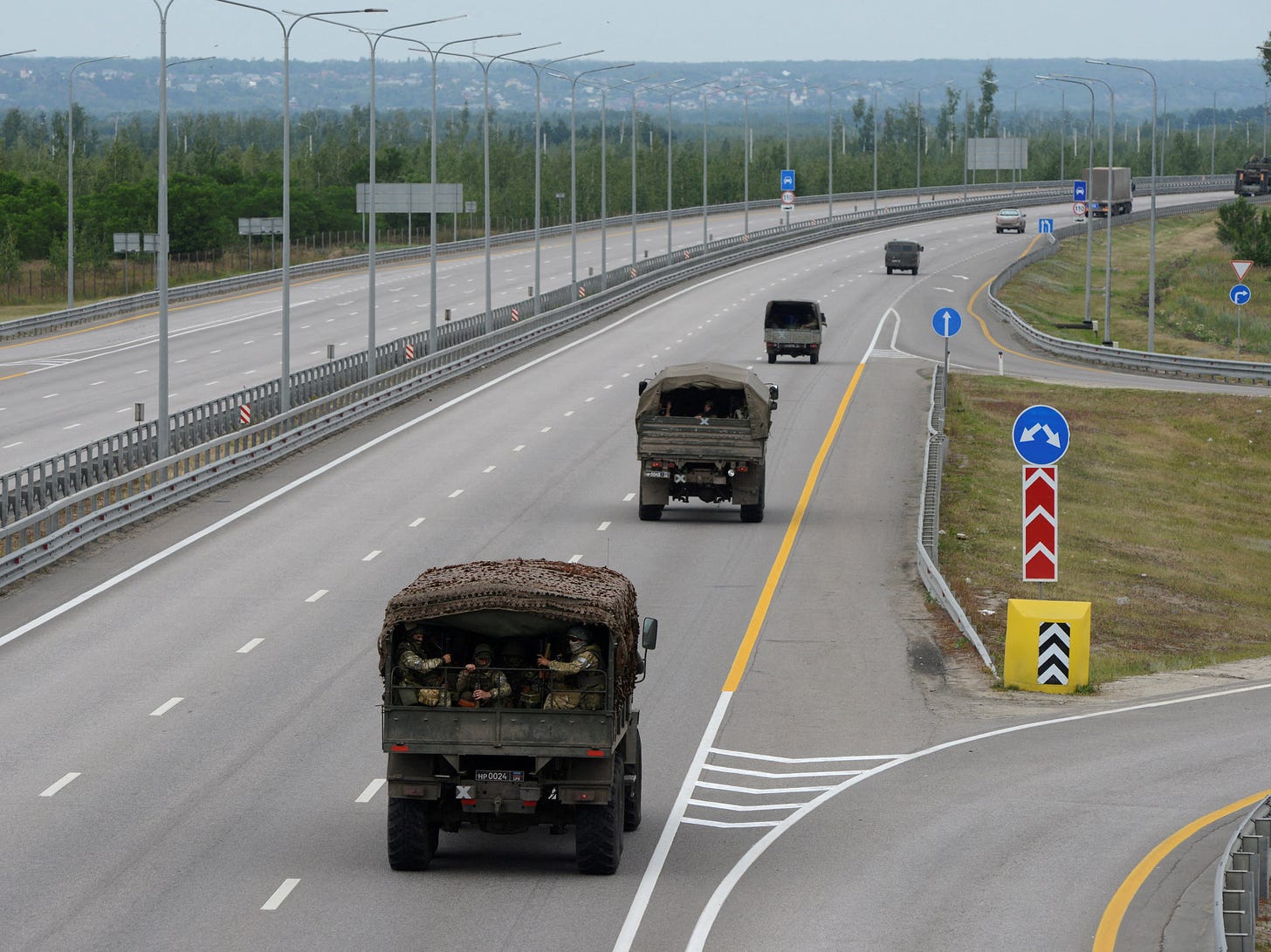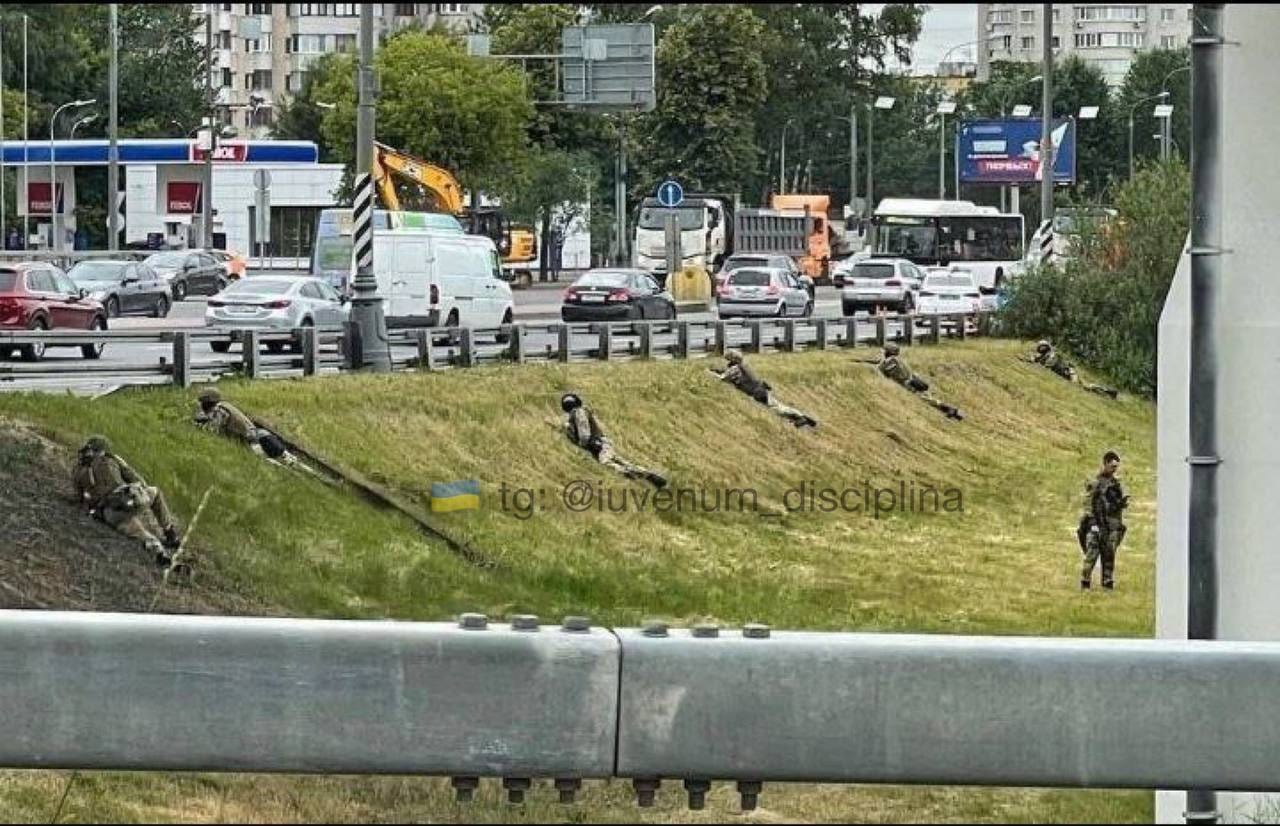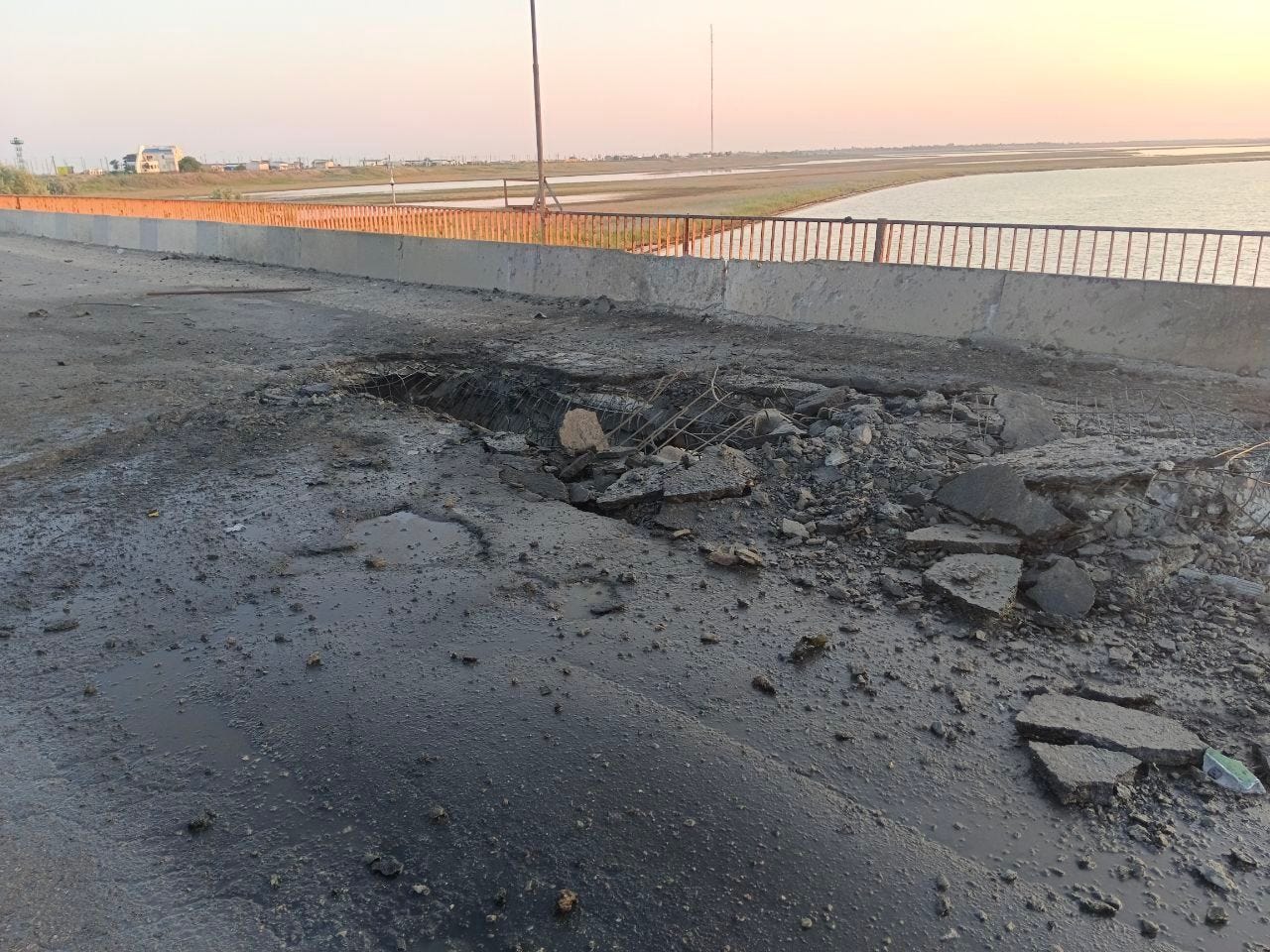Ukraine's greatest successes in its war with Russia have come after it has degraded the Russians' logistics capabilities and then attacked its forces with armor and infantry.
That appears to be what is going on now, especially as the Russian military is still coming to grips with the Wagner mutiny and its aftermath. JL
Phillips O'Brien reports in his substack:
The Ukrainians have had some of their greatest successes when they concentrated on logistics attacks. From stopping the Russian drive on Kyiv to forcing Russian troops to withdraw from the west bank of the Dnipro in Kherson, Ukrainian logistics attacks have been a harbinger of success. The Ukrainians counteroffensive has ramped up its attritional phase by making the destruction of Russian logistics one of its main goals for the time being, (an) aggressive attrition of Russian fighting capabilities. Ukraine has shown the ability to adjust to what they encountered on the battlefield, (so) is now methodically weakening Russian logistics, giving itself the best chance for major gains this summer.So what the heck happened in Russia? In some ways the true motivation for the mutiny of Yevgeny Prigozhin’s Wagner force is and will remain difficult to unravel (and it might be said that Prigozhin himself had multiple motivations, which is why when faced with the prospect of catastrophic success he lost his nerve.) Certainly it was a sign of great instability and weakness as the heart of the Russian state or as the Ukrainians said below—an example of the Kremlin snake eating its own tail.
It might be best to start with what we do know and then try and then look at the important unknowns to try and understand what this was.
What do we know? We know that on June 24 Prigozhin claimed that the Russian military launched an attack on a Wagner military base (this looks very much like a pretext) and killed Wagner troops and in reply he had no alternative but to take up arms against the military high command (Shoigu and Gerasimov). This was not said to be a coup against Putin, but an attempt by Wagner to defend itself against the military. Indeed, in retrospect this seems more like a mutiny by an armed part of the Russian state to try and make it power known. It was probably not a deliberate attempt to overthrow the state (though it could have gone down that road as the mutiny was very effective). So for now I prefer the phrase mutiny over coup.
Having stated the mutiny, things escalated very rapidly. It looks like Prigozhin/Wagner had prepared for some sort of militarized uprising for a while before hand. He was thus able to put a plan into action astonishingly quickly. In only a few hours (less than a day) two of the most strategic cities for the Russian war against Ukraine (Rostov and Voronezh) had come mostly under Wagner control. As these cities are amongst the most important in controlling the movement of military supplies into occupied Ukraine, they should have been protected by the Russian state. However Wagner seemed to be able to take them with little organized opposition.
Then Wagner set out for Moscow. Again, they had obviously stockpiled a significant amount of supplied to get the convoy going so quickly. It showed the kind of logistical planning which the Russian army has regularly seemed to lack during this war.
The convoy made very swift progress. Putin, who declared Prigozhin a criminal in an angry morning address and called for his onetime sommelier’s arrest, seemed impotent to stop it. Supposedly there were some air attacks against Wagner, but if reports are to be believed this led to a far greater loss in Russian helicopters (up to 5) than it did to Wagner vehicles (one truck). Things seemed to be going do disastrously wrong for the Putinist state that troops were being deployed around Moscow itself as it seemed Wagner would get there in relatively short order. At this point, it had all the hallmarks of an actual attempt at a coup d’etat.
Such fast moving and impactful developments make it almost certain, as I said before, that Wagner had a plan for a military uprising already well worked out, had stockpiled equipment, and had analyzed the weak points in the Russian military and state that it could exploit.
note: US IC sources have stated a few times in the last few hours that Wagner has this kind of operation planned for a while. Both the New York Times and CNN have published stories to this effect.
https://www.nytimes.com/2023/06/24/world/europe/us-intel-prigozhin-warning.html
https://edition.cnn.com/2023/06/24/politics/us-western-officials-russia-prigozhin-putin/index.html
What dont we know?
However here is when things get really weird and a little confusing—and call into question the whole purpose of the mutiny. As the convoy was approaching Moscow it was announced that Prigozhin and Putin has struck a bargain (mediated by the Belarusian strongman Aleksander Lukashenko). The Wagner column seemed to turn instantly around and head back to base. In Rostov Wagner forces packed up and left and by the end of the evening it was stated that Prigozhin was entering a form of exile and was on his way to Belarus. It was quite a remarkable turn of events in a very short period of time—which begs the questions why did Prigozhin do it?
It might be that Prigozhin had actually succeeded too well during the day and was on the point of threatening the whole Russian state—a form of catastrophic success as it were. If what he really wanted to protect his position against the military, humiliate Shoigu and Gerasimov, and protect his money and authority, then his main would have been to get Putin’s recognition/attention not to tear down the whole edifice of the Russian state.
Faced with the reality of what was happening, he took what seemed like a hasty deal to save himself (temporarily) and safeguard his money and family. What we dont know is if he saved Wagner—its not clear how many of his mercenaries are coming with him to Belarus, or how many will be forced to now sign contracts with the Russian military. We also dont know what will happen to Shoigu and Gerasimov. If they remain in positions of power, and Prigozhin is stuck in Belarus, it seems like Prigozhin took a deal to save his own skin. However, its hard to see that deal holding for a long time, especially if he is losing control of Wagner.
So what might have been a show of power by Prigozhin to protect Wagner and himself, ended up threatening the whole Russian state, and in the end a hasty deal was struck—the contours of which still need to be worked out. However neither Prigozhin or Putin are probably sleeping soundly these days.
Of course the really important thing that we know is that this uprising showed the profound weakness of the Putinist state. When faced with an armed mutiny in some of the most strategically important areas of Russia, and a march on the capital itself, the Russian government was slow to react and even slow to use violence to try and save itself. There seemed to be too few military forces around (the vast majority of the Russian army is in Ukraine), command was slow to react and, even more problematic, it might be that military commanders themselves did not want to risk their forces for the state when it seemed the outcome was in question.
In the end, Putin had to spare the leader of a public mutiny against his military, led by a man (Prigozhin) who had been named a criminal that morning. At the same time, the deal seem to glamorize Wagner for some of the Russian people, who last night came out to congratulate Wagner forces. For a dictatorship built on the idea of unchallenged power, this was an extreme humiliation, and its hard to see the genie of doubt ever being forced back into the bottle. So, if Prigozhin might have lost in the short term, Putin is likely to be the long-term loser
Ukrainians Return to What they Do Best
The war in Ukraine continued in its methodical way last week, but there were important indications that the Ukrainians counteroffensive has ramped up its attritional phase by making the destruction of Russian military logistics one of if not its main goal for the time being. There was a rash of reports starting last weekend that Ukraine was now hitting major depots that had previously been beyond their effective range (HIMARS) range. Around this time last week it was the reports of the attacks on Rikove
https://twitter.com/PhillipsPOBrien/status/1670351999794044929?s=20
Since then, there have been more and more reports—and it seems that Ukraine is doing everything possible to hinder the flow of military supplies to Russian forces defending against the counteroffensive.
https://twitter.com/PhillipsPOBrien/status/1671941004683886596?s=20
Maybe the most interesting attack of this week (which really showcased Ukrainian capabilities) was the attack on the Chonhar bridge, one of the vital roadways which links Crimea to the mainland.
It was an attack that was captured extremely well on film, and you can see the Ukrainian missiles (Storm Shadows supplied by the UK) hitting the bridge with pin-point accuracy. The video is worth a look. As someone who studied the question of accuracy in WWII at the start of my career, its still extraordinary to see just how systems work these days (at least modern NATO ones).
https://twitter.com/i/status/1671963493954625558
If you go back to the war, the Ukrainians have had some of their greatest successes when they have concentrated on logistics attacks. From stopping the Russian drive on Kyiv to forcing Russian troops to withdraw from the west bank of the Dnipro in Kherson oblast, Ukrainian logistics attacks have been a harbinger of success. By focussing on them Ukraine is also showing how the campaign has unfolded.
It might be that starting in early June the Ukrainians went for direct assaults on the Russian lines, to see what kind of resistance they would face. After a few days it was clear that Russian lines would not collapse. The Ukrainians made gains, but could not break through (breakthroughs in this war are really hard). Understanding that they were not going to quickly roll up the Russian line, not wanting to waste their own forces, and opting for a more deliberate strategy, what we are seeing now is the Ukrainians opting for aggressive attrition of Russian fighting capabilities. I wrote about it in The Atlantic in a piece published yesterday.
https://www.theatlantic.com/ideas/archive/2023/06/ukraine-counteroffensive-russia-war-advance/674485/
How long will this continue? Probably a while yet. Ukraine is in no rush. The summer is just starting, the vast majority of the Ukrainian strike force has not been seen, and Ukraine is integrating new ranged systems like storm shadows. The only real impatience is being shown by reporters and press who for some reason expect quick results and overreact when victory does not come immediately. Ukraine has shown the ability to adjust to what they encountered on the battlefield, is now methodically weakening Russian logistics (and other targets) and is giving itself the best chance for major gains sometime this summer.
The odds of a real success are still in their favor.























0 comments:
Post a Comment